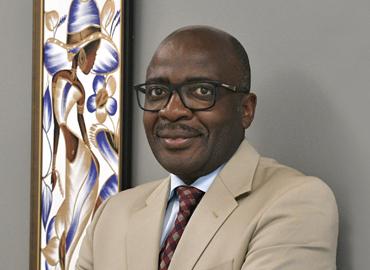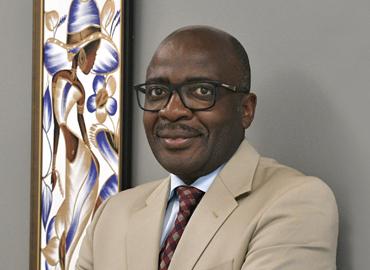September 7, 2021
by Cynthia Macdonald – A&S News
Alexie Tcheuyap, a prominent scholar of African cinema, literature and media studies, has been named a Fellow of the Royal Society of Canada.Photo credit: Diana Tyszko.
Alexie Tcheuyap, a prominent scholar of African cinema, literature and media studies, has been named a Fellow of the Royal Society of Canada.
Tcheuyap is a professor in the Department of French, and has served as vice-dean, academic life & equity in the Faculty of Arts & Science since 2019. Last week, he assumed his most recent senior leadership position as the University of Toronto’s associate vice-president and vice-provost, international experience.
The Royal Society citation recognizes Tcheuyap’s many contributions to literary analysis and media criticism in a postcolonial context; his foundational authorship on Francophone African cinema; and his seminal research on concepts such as madness, fear and violence as they are depicted in art and the media.
Says Tcheuyap: “This fellowship is the dream distinction, the supreme recognition for any Canadian scholar. I feel extremely honoured and privileged to be acclaimed and endorsed by my colleagues for my work. Recognition by peers of the Royal Society of Canada is the highest possible honour a researcher can receive in their lifetime.”
“The Department of French is delighted to see Alexie’s tremendous contribution to the field of African literature and cinema recognized by the Royal Society,” says Anne-Marie Brousseau, chair of the Department of French. “In the last ten years, he has been an influential voice regarding African culture, postcolonial theory, and postcolonial violence. In addition to his impressive publication record on the topic, he was editor of the Canadian Journal of African Studies and President of the Canadian Association of African Studies.”
Tcheuyap is one of three Faculty of Arts & Science scholars recognized by the Royal Society of Canada in 2021. Norman Murray, an astrophysical theorist and professor at the Canadian Institute for Theoretical Astrophysics, has also been named a fellow. And Wendy H. Wong, a professor in the Department of Political Science, has been named to the Society’s College of New Scholars, Artists and Scientists.
“This year, the Royal Society of Canada recognizes three scholars whose work reflects the depth and diversity of the Faculty of Arts & Science,” says Melanie Woodin, dean of the Faculty.
“While studying such far-ranging disciplines as astrophysical dynamics; African literary, cinema and media studies; and global affairs, they share the same insightfulness, passion and curiosity. We are very excited and proud that they have received these well-deserved honours.”
Tcheuyap was born in Cameroon. He holds a Doctorat de Troisième Cycle in literature from the University of Yaoundé and received his PhD in French Studies from Queen’s University. Prior to his arrival at U of T, he taught in Cameroon and the University of Calgary. He has also been a visiting professor in South Africa, the United States, Germany and France.
One of Tcheuyap’s signature achievements has been to shine a light on the complexity of cinema and literature in postcolonial francophone Africa. While many are familiar with the largely political works of Senegalese writer and filmmaker Ousmane Sembène — sometimes called “the father of African film” — Tcheuyap’s Postnationalist African Cinemas (2011) has revealed the ways in which other modern African creators continue to produce a rich body of cultural production, combining elements of the comedy, crime, dance, horror and epic genres with elements that are uniquely African.
In this respect Tcheuyap has been a pioneer, especially with respect to his analysis of African cinema. “The first films made in Africa were produced by colonial powers, and African directors did not start producing their own films until the early 1950s,” he says. A small body of research on the subject ensued in North America, but it wasn’t capturing the full picture of creative activity in the region.
“The view of Africa that has been constructed in the west has been one of misery and sadness, ignoring everything else,” Tcheuyap says. “Not that these things don’t exist, but there is a great deal beside that. So I have been able to bring forward many new orientations in my work, shaping a new paradigm in terms of categories, in terms of aesthetics, in terms of discourses.”
One of Tcheuyap’s major works is De l’écrit à l’écran (2005), the first book on the subject of book-to-film adaptation in Africa. Here, he details the ways in which adaptation in Africa has had a more urgent history than in Hollywood. Citing Sembène as an example, Tcheuyap says: “He was a novelist originally, but he realized that novels in French could not be read by the population of Senegal. As a consequence, he decided to adapt his novels to film so that his message could be accessible to the population.” In the films of Sembène, who died in 2007, characters spoke in African languages and actors were chosen from local populations.
Tcheuyap’s other books include: Esthétique et folie dans l’œuvre romanesque de Pius Ngandu Nkashama (1998) ; Autoritarisme, presse et violence au Cameroun (2014) ; and Avoir peur: insécurité et roman en Afrique francophone (2019, with Hervé Tchumkam). He is currently completing another book on African cinema for Routledge.
Tcheuyap is gratified that the work of creators in francophone Africa is now not merely the province of week-long literary and film festivals, but widely available through the internet. This has been especially beneficial for filmmakers. “The technology to make films is also much more accessible, so it’s much easier for Africans to shoot, produce and show their films,” he says. “In that sense, it’s been a true success story.”
Source: University of Toronto


